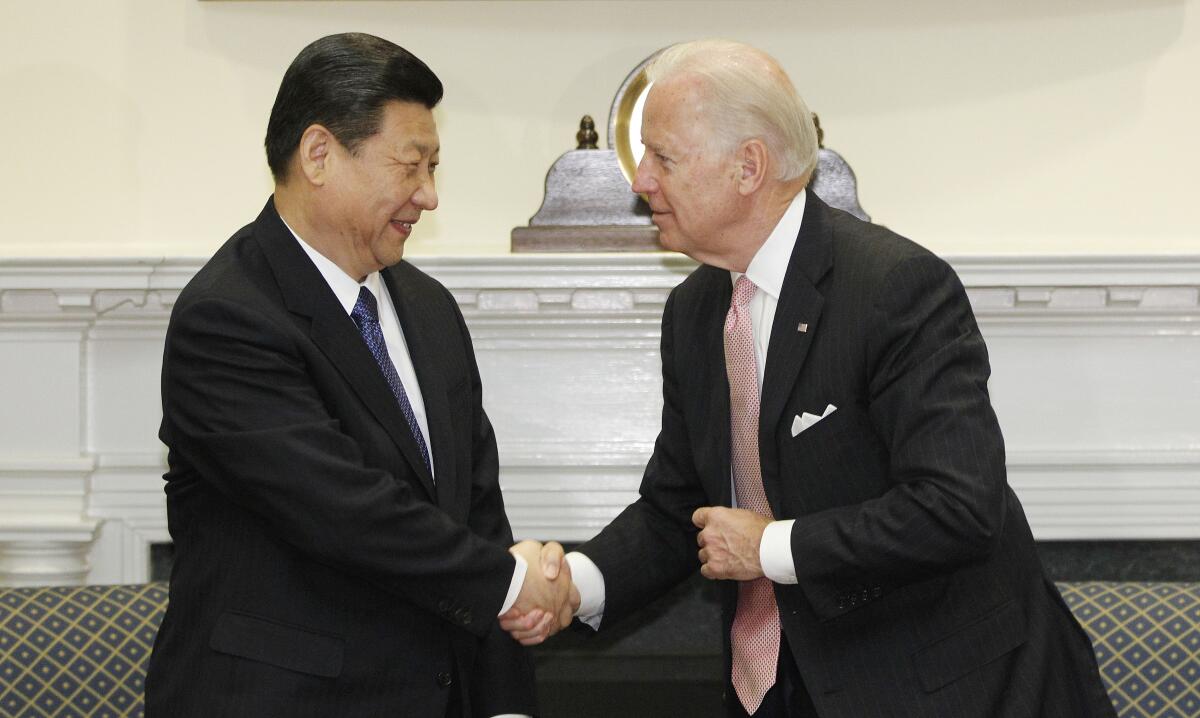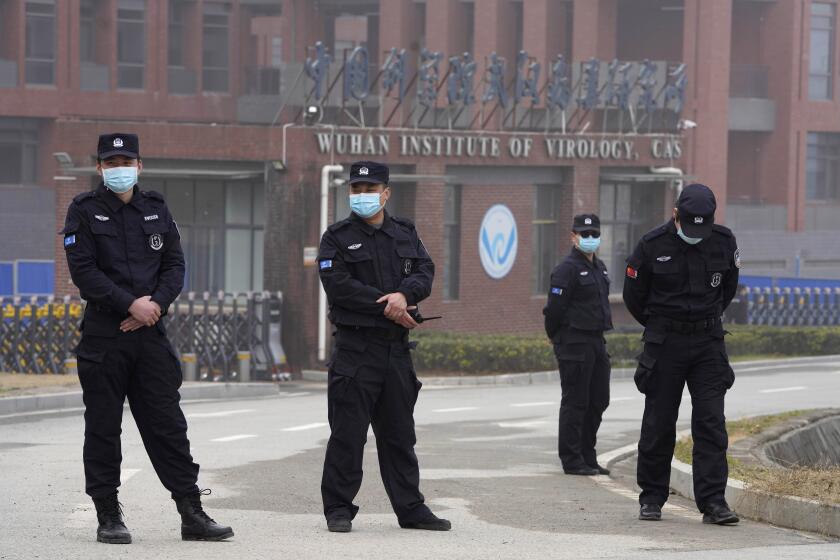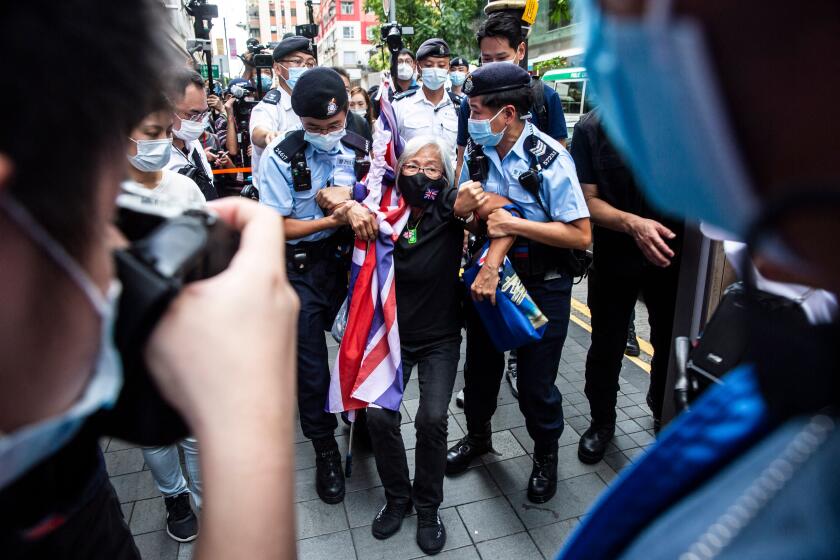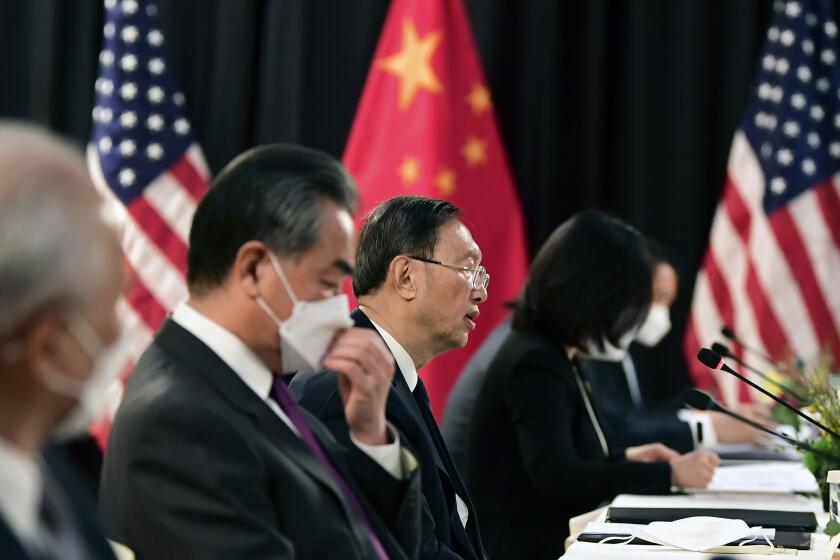Biden calls China’s Xi to try to improve a fraught Sino-U.S. relationship

WASHINGTON — President Biden spoke with Chinese President Xi Jinping on Thursday amid growing frustration on the U.S. side that high-level engagement between the two leaders’ top advisors has been largely unfruitful so far.
Biden initiated the call with Xi, the second between the two leaders since Biden took office in January. It comes at a moment when there is no shortage of thorny issues between the two nations, including cybersecurity breaches originating from China, Beijing’s handling of the COVID-19 pandemic and what the White House has labeled as “coercive and unfair” trade practices by the Chinese.
But Biden’s aim with the 90-minute call was less focused on any of those hot-button issues and instead centered on discussing the way ahead for the U.S.-China relationship after it got off to a decidedly rocky start in the early days of his presidency.
The White House said in a statement that the “two leaders had a broad, strategic discussion in which they discussed areas where our interests converge, and areas where our interests, values, and perspectives diverge.”
The White House is hopeful the two sides can work together on issues of mutual concern — including climate change and preventing a nuclear crisis on the Korean Peninsula — despite growing differences.
Beijing, however, has pushed back against U.S. pressure and increasingly has suggested it could remain broadly uncooperative until Biden dials down criticism on what it deems Chinese internal matters.
The latest U.S. intelligence report on the origins of COVID-19 is inconclusive on whether the coronavirus spread from animals or leaked from a lab.
During their conversation Thursday, Xi appeared to echo some of the complaints, telling Biden that U.S. government policy toward China caused “serious difficulties” in relations, China’s official Xinhua News Agency reported.
“This is not in the basic interests of the two peoples,” Xi said, according to Xinhua.
“Chinese-U.S. confrontation will bring disaster to both countries and the world,” he added.
Xi said the two sides should cooperate on climate change, epidemic prevention, economic recovery and other issues, Xinhua reported.
Thousands of people from Hong Kong are fleeing increasing Chinese control over their lives and moving to Britain, which ruled the city for 156 years.
Ahead of the call, a senior Biden administration official said the White House has been unsatisfied with early engagements with the Chinese.
The official, who was not authorized to comment publicly and spoke on the condition of anonymity, said White House officials were hopeful that Xi’s hearing directly from Biden could prove beneficial.
The White House official said Biden made clear to Xi that he had no intention of moving away from his administration’s policy of pressing China on human rights, trade and other areas where it believes China is acting outside international norms.
High-level engagement in the early going has been most notable for each side blasting the other with recriminations.
Start your day right
Sign up for Essential California for the L.A. Times biggest news, features and recommendations in your inbox six days a week.
You may occasionally receive promotional content from the Los Angeles Times.
Last week, Chinese Foreign Minister Wang Yi warned Biden climate envoy John F. Kerry that deteriorating U.S.-China relations could undermine cooperation on climate change. Wang told Kerry, who was visiting the Chinese port city of Tianjin for climate talks with his Chinese counterparts, that such cooperation could not be separated from the broader relationship and called on the U.S. to take steps to improve ties, according to China’s Foreign Ministry.
In July, Deputy Secretary of State Wendy Sherman faced a long list of demands and complaints, including accusations that the U.S. was trying to contain and suppress China’s development. Vice Foreign Minister Xie Feng urged the U.S. “to change its highly misguided mindset and dangerous policy.”
In March, Secretary of State Antony J. Blinken and White House national security advisor Jake Sullivan had heated exchanges with the Chinese Communist Party’s foreign affairs chief, Yang Jiechi, when they met in Anchorage. At that meeting, Yang accused the U.S. of failing to deal with its own human rights problems and took issue with what he said was American hypocrisy.
Biden administration officials suspect that some of the rhetoric in those high-profile meetings was more about playing to a domestic audience through the press than sending a message to the White House. With that in mind, Biden highlighted the importance of two leaders’ ability to have private conversations and be clear about their priorities, the administration official said.
Beijing’s rejection of criticism from America and its friends has grown shriller as the Biden administration demonstrates its ability to pull allies together.
From the start of his presidency, Biden has sought to put greater focus on China, rallying allies to speak in a more unified voice about Beijing’s human rights record, its trade practices and its increasingly assertive military, which has unnerved U.S. allies in the Pacific. Biden sees China as the most significant economic competitor to the U.S. and a growing national security concern.
But he has also expressed hope that his long-running working relationship with Xi, one that dates back to when he served as President Obama’s vice president, could pay dividends on certain critical issues. The two leaders spent time on the call reminiscing about their time traveling together when they were both vice presidents, the senior administration official said.
The White House said the two men agreed during the call to engage “openly and straightforwardly” on issues where their nations are at odds and where there is agreement.
More to Read
Sign up for Essential California
The most important California stories and recommendations in your inbox every morning.
You may occasionally receive promotional content from the Los Angeles Times.













